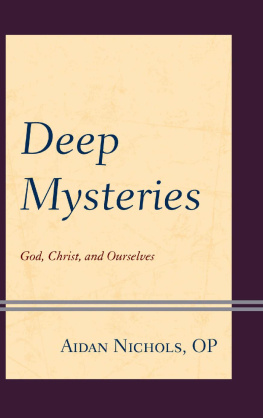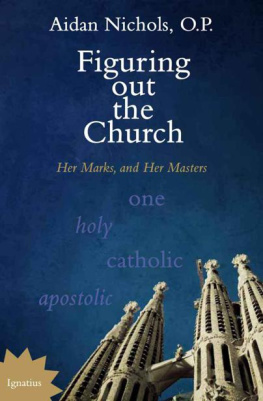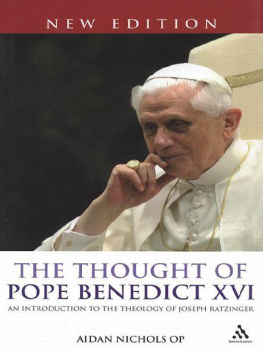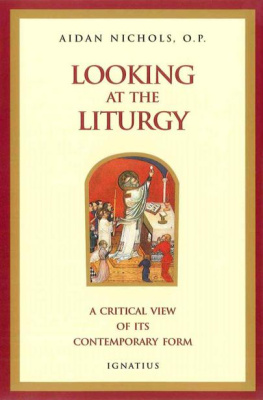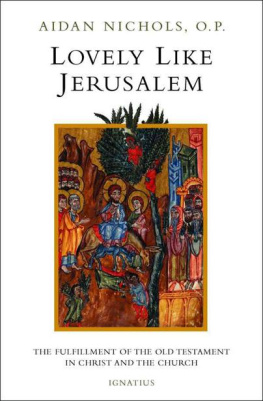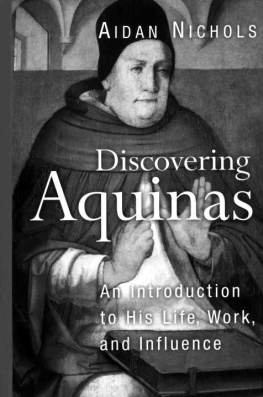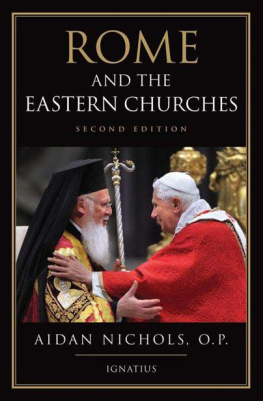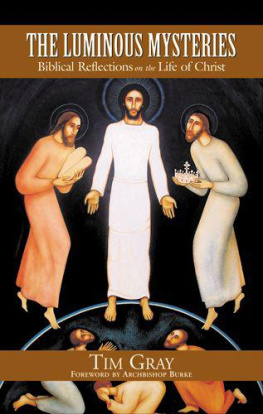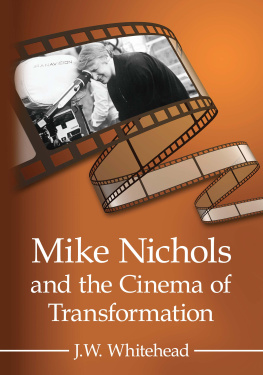Aidan Nichols - Deep Mysteries: God, Christ, and Ourselves
Here you can read online Aidan Nichols - Deep Mysteries: God, Christ, and Ourselves full text of the book (entire story) in english for free. Download pdf and epub, get meaning, cover and reviews about this ebook. year: 2018, publisher: Fortress Academic, genre: Religion. Description of the work, (preface) as well as reviews are available. Best literature library LitArk.com created for fans of good reading and offers a wide selection of genres:
Romance novel
Science fiction
Adventure
Detective
Science
History
Home and family
Prose
Art
Politics
Computer
Non-fiction
Religion
Business
Children
Humor
Choose a favorite category and find really read worthwhile books. Enjoy immersion in the world of imagination, feel the emotions of the characters or learn something new for yourself, make an fascinating discovery.
- Book:Deep Mysteries: God, Christ, and Ourselves
- Author:
- Publisher:Fortress Academic
- Genre:
- Year:2018
- Rating:4 / 5
- Favourites:Add to favourites
- Your mark:
- 80
- 1
- 2
- 3
- 4
- 5
Deep Mysteries: God, Christ, and Ourselves: summary, description and annotation
We offer to read an annotation, description, summary or preface (depends on what the author of the book "Deep Mysteries: God, Christ, and Ourselves" wrote himself). If you haven't found the necessary information about the book — write in the comments, we will try to find it.
Deep Mysteries: God, Christ, and Ourselves — read online for free the complete book (whole text) full work
Below is the text of the book, divided by pages. System saving the place of the last page read, allows you to conveniently read the book "Deep Mysteries: God, Christ, and Ourselves" online for free, without having to search again every time where you left off. Put a bookmark, and you can go to the page where you finished reading at any time.
Font size:
Interval:
Bookmark:
Deep Mysteries
Deep Mysteries
God, Christ, and Ourselves
Aidan Nichols, OP
LEXINGTON BOOKS/FORTRESS ACADEMIC
Lanham Boulder New York London
Published by Lexington Books/Fortress Academic
Lexington Books is an imprint of The Rowman & Littlefield Publishing Group, Inc.
4501 Forbes Boulevard, Suite 200, Lanham, Maryland 20706
www.rowman.com
Unit A, Whitacre Mews, 26-34 Stannary Street, London SE11 4AB
Copyright 2019 by The Rowman & Littlefield Publishing Group, Inc.
All rights reserved. No part of this book may be reproduced in any form or by any electronic or mechanical means, including information storage and retrieval systems, without written permission from the publisher, except by a reviewer who may quote passages in a review.
British Library Cataloguing in Publication Information Available
Library of Congress Cataloging-in-Publication Data
Names: Nichols, Aidan, author.
Title: Deep mysteries : God, Christ and ourselves / Aidan Nichols OP.
Description: Lanham : Fortress Academic, 2018. | Includes bibliographical references and index.
Identifiers: LCCN 2018040571 (print) | LCCN 2018052902 (ebook) | ISBN 9781978704848 (electronic) | ISBN 9781978704831 (cloth : alk. paper)
Subjects: LCSH: Jesus Christ--Historicity. | Jesus Christ--Biography. | Mystery. | Spirituality--Christianity.
Classification: LCC BT303.2 (ebook) | LCC BT303.2 .N47 2018 (print) | DDC 232--dc23
LC record available at https://lccn.loc.gov/2018040571
 TM The paper used in this publication meets the minimum requirements of American National Standard for Information Sciences Permanence of Paper for Printed Library Materials, ANSI/NISO Z39.48-1992.
TM The paper used in this publication meets the minimum requirements of American National Standard for Information Sciences Permanence of Paper for Printed Library Materials, ANSI/NISO Z39.48-1992.
Printed in the United States of America
This book is a cocktail of ingredients that are not usually combined. Its account of the New Testament is largely derived from Evangelical Protestant sources, mixed in with some older Roman Catholic exegesis. This is because I wish to maintain the full historicity of the principal Gospel events whose significance lies at the heart of this work. My reflection on those events is guided by the Fathers of the Church and the historic Liturgies. (Among the former, I am especially indebted to St. Leo, whose approach I find congenial.) It extends to the most inspirational of modern theologians who, for me, are Hans Urs von Balthasar in the Catholic sphere and Sergius Bulgakov in the Orthodox (the latter, however, will appear here only in a comparatively minor supporting role).
The way in which I relate the New Testament events to the spiritual deployment of those events in the life of the believing and worshipping Church is taken essentially from St. Thomas Aquinas. I follow the main lines of his account of the causality of the chief mysteries of the life of Christ. And incidentally, the potency of those mysteries has not been lost on artistsso I also make appeal to the way they are refracted in visual art, especially the art of the icon.
Finally, my basic idea in writing this book derives from the early twentieth century Irish Benedictine monk, Dom Columba Marmion, beatified by Pope John Paul II. Marmions Christ in His Mysteries was the first work of solid spiritual theology I ever read, while working as a volunteer in the Legion of Mary hostel for the destitute in Dublin 7, during a gap year between leaving school and going to university. I had behind me years of Anglican worship. As a Roman Catholic, I had recently been instructed, as was usual then in England, by the Penny Catechism. But Marmion opened my eyes to riches untold.
Blackfriars, Cambridge
Pentecost, 2018
How credible are the New Testament reports about the main events in the life of Christ and the origins of his Church? Two initial objections, which we can call historical in character, are likely to arise. The first concerns the written records of that testimony, the New Testament textsabove all the Gospelshave they been handed down in their integrity? Or were they perhaps tampered with in transmission, notably in the early centuries of the Common Era? Graham Stanton, an exegete working in the secular academy, remarks in his report on state-of-the-art scholarship in this area:
In recent decades important steps forward have been taken. The discovery of papyri which pre-date the great fourth-century uncial manuscripts has been a major advance. Even though the second and third century papyri are often fragmentary, they confirm the general reliability of the great fourth-century uncials which contain the full text of the Gospels.
Then in the second place, there is a question about the origins, composition, and dating of the textsabove all, once again, of the Gospels. Concerning the handing on of memories about Jesus, is a general skepticism warranted? With pardonable irritation, the mid-twentieth century exegete Vincent Taylor, pointed out that Jesuss first disciples were hardly
translated to heaven immediately after the Resurrection.... The hundred and twenty at Pentecost did not go into permanent retreat; for at least a generation they moved among the young, Palestinian communities, and through preaching and fellowship their recollections were at the disposal of those who sought information.
Without further ado, let us introduce the principal witnesses among those apostles and apostolic men.
Among them, I take first Saint Paul. Pauls early letters were collected together and published in codex formwhich is possibly the origin of the Christian preference for the codex over against the much more widespread roll. That preference is especially notable where Christian reproduction of sacred texts, and above all the Gospels, was concerned. Yet considered as informational sources for the life of Jesus, the Pauline letters, the earliest of them written less than twenty years after the Crucifixion, may seem at first sight stony ground.
Paul does not cite any Gospel bookswhich conceivably, toward the end of his life he might have done. It is arguable that both Matthews Gospel book and Lukes were produced before the apostles letter-writing activity ceased, around the end of the 50s of the first century of our era. Nor does Paul give much information about Jesuss life (and teaching) from the oral tradition, the earliest apostolic preaching, which preceded the making of all such books.
By itself, reticence in citing written sources might not be odd. While the original apostles still lived and could be heard viva voce, it was less important to refer to their writings. Moreover, Christians had no equivalent to the synagogue schools where those writings could be taught and studied. Nor did they have, as yet, a procedure for officially recognizing certain texts as especially authoritative. And in any case, the expense of parchment, and its consequent rarity, would discourage appeal to books. Yet the Gospel books themselves draw on the all-important common oral tradition of the sayings and doings of Jesus. So in this perspective, Pauls extreme simplification of data about the life of Jesus is surprising, and, more than surprising, it is striking.
That does not make Pauls letters a tabula rasa for the question of the Jesus of history. Fragments of catechesis, precise and circumstantial in kind, touching the Last Supper and the Resurrection, can be found in his Corinthian correspondence. Among moral prescriptions, Paul can distinguish, as in First Corinthians (7:10), directives that issue from Jesus himself, carefully separating these from his own more personal advice. In the Letters to Rome and Corinth, Pauls counsels reflect evangelical sayings (for instance, Romans 12:1114; I Corinthians 4:1213, 9:14, 12:3), A basic biography of Jesus could be gleaned from references scattered about the Letters.
Next pageFont size:
Interval:
Bookmark:
Similar books «Deep Mysteries: God, Christ, and Ourselves»
Look at similar books to Deep Mysteries: God, Christ, and Ourselves. We have selected literature similar in name and meaning in the hope of providing readers with more options to find new, interesting, not yet read works.
Discussion, reviews of the book Deep Mysteries: God, Christ, and Ourselves and just readers' own opinions. Leave your comments, write what you think about the work, its meaning or the main characters. Specify what exactly you liked and what you didn't like, and why you think so.

